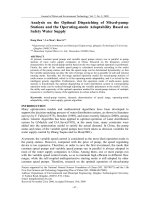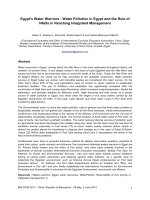- Trang chủ >>
- Khoa Học Tự Nhiên >>
- Vật lý
trials of reason plato and the crafting of philosophy jan 2008
Bạn đang xem bản rút gọn của tài liệu. Xem và tải ngay bản đầy đủ của tài liệu tại đây (1.32 MB, 296 trang )
Trials of Reason
This page intentionally left blank
Trials of Reason
Plato and the Crafting of Philosophy
DAVID WOLFSDORF
1
2008
3
Oxford University Press, Inc., publishes works that further
Oxford University’s objective of excellence
in research, scholarship, and education.
Oxford New York
Auckland Cape Town Dar es Salaam Hong Kong Karachi
Kuala Lumpur Madrid Melbourne Mexico City Nairobi
New Delhi Shanghai Taipei Toronto
With offices in
Argentina Austria Brazil Chile Czech Republic France Greece
Guatemala Hungary Italy Japan Poland Portugal Singapore
South Korea Switzerland Thailand Turkey Ukraine Vietnam
Copyright ß 2008 by Oxford University Press, Inc.
Published by Oxford University Press, Inc.
198 Madison Avenue, New York, New York 10016
www.oup.com
Oxford is a registered trademark of Oxford University Press
All rights reserved. No part of this publication may be reproduced,
stored in a retrieval system, or transmitted, in any form or by any means,
electronic, mechanical, photocopying, recording, or otherwise,
without the prior permission of Oxford University Press.
Library of Congress Cataloging-in-Publication Data
Wolfsdorf, David, 1969–
Trials of reason : Plato and the crafting of philosophy / David Wolfsdorf.
p. cm.
Includes bibliographical references and index.
ISBN 978-0-19-532732-8
1. Plato. 2. Philosophy, Ancient. I. Title.
B395.W8155 2007
184—dc22 2007003713
246897531
Printed in the United States of America
on acid-free paper
ùP ỡcớ úụỉ ặòứớ ọeũ ùPọ iớ êíớùỉụù wũ
Kêg ổặúụcũ ỡíớ ồNỡỉ Iồò; ùĩỉũ ọí ỡồ Xọ
ọỉặỗêùFúặ ổỡùớ ặd ẳùổùớ ặụíúụúồớ
This page intentionally left blank
acknowledgments
I thank the University Professors Program at Boston University; C. A. P. Ruck
of the Classics Department at Boston University, who first instructed me in Latin
and Greek, and K. Haynes, then a graduate student, who first oriented me in
the Western humanities tradition; R. Foster, magistro optimo of the Universita
`
Gregoriana and the Vatican; the British School in Athens; the Herder Institut at
the Universita
¨
t Leipzig; the Leibnizleute and the Seminar fu¨r klassische Philologie
at the Universita
¨
t Heidelberg, especially G. W. Most for demonstrating the
importance of and facilitating my research in the history of scholarship and
das Nachleben der Antike; the Classics Department at the University of Chicago
for allowing me the freedom to pursue philosophical studies outside of
classics; M. Nussbaum, R. Kraut, E. Asmis, and the late A. W. H. Adkins; the
Philosophy Department at Fairfield University, T. Regan, J. Gordon, C. Naser,
K. Schwab, J. Thiel, M. Patton, and V. Rosivach, for their humanity and collegi-
ality; the Writing Program and the Philosophy Department at Boston University,
especially M. Prince, J. Walsh, K. Halil, C. Griswold, and D. Roochnik; the
Philosophy Department at Temple University, and C. Dyke for encouraging my
interest in Greek mathematics; the Philadelphia philoplatonikoi, especially
A. Payne and C. Kahn; the editors of the classics and ancient philosophy journals
who have published my papers; the many scholars of Plato’s early dialogues from
whom I have learned so much, above all G. Santas, N. Smi th and T. Brickhouse,
H. Benson, T. Penner, and the late G. Vlastos; and Oxford University Press, for
giving this project a chance.
A number of people have sustained and inspired me at various points since
I began to study Plato in earnest. I am deeply grateful to B. K. Fowler, F. Whiting,
B. Gru¨ndler, A. Mori, L. Nalencz, R. E. Harder, M. Haley, R. Islam, M. Mello,
M. Schuder, J. Lorenz, my brothers Ronan and Adam, and my parents Joseph
Isidore and Gail Anne Wolfsdorf to whom this labor of love is dedicated.
This page intentionally left blank
contents
1. Interpretation 3
1 Introduction 3
2 Interpreting Plato 4
3 The Political Culture of Plato’s Early Dialogues 7
4 Dialogue 13
5 Character and History 16
6 The Mouthpiece Principle 19
7 Forms of Evidence 25
2. Desire 29
1 Socrates and Eros 29
2 The Subjectivist Conception of Desire 33
3 Instrumental and Terminal Desires 40
4 Rational and Irrational Desires 49
5 Desire in the Critiqe of Akrasia 51
6.1 Interpreting Lysis 59
6.2 The Deficiency Conception of Desire 60
6.3 Inauthentic Friendship 68
6.4 Platonic Desire 72
7 Antiphilosophical Desires 74
3. Knowledge 86
1 Excellence as Wis dom 86
2 The Epistemic Unity of Excellence 88
3 Dunamis and Techne
ˆ
100
4 Goodness and Form 110
5 The Epistemological Priority of Definitional Knowledge 121
6 Ordinary Ethical Knowledge 131
4. Method 146
1 The Socratic Fallacy 146
2 Socrates’ Pursuit of Definit ions 148
3.1 Hupothesis 157
3.2 Two Postulates 162
3.3 The Geometrical Illustration 164
3.4 Geometrical Analysis 170
3.5 The Method of Reasoning from a Postulate 173
4 Elenchus and Hupothesis 177
5 Knowledge and
A
itia 181
6.1 F-conditions 185
6.2 Cognitive Security 192
5. Aporia 197
1 Forms of Aporia 197
2 Dramatic Aporia 201
3.1 The Example of Charmides 210
3.2 Charmides as Autobiography 211
3.3 The Politics of So
ˆ
phrosune
ˆ
213
3.4 Critias’ Philotimia 217
3.5 Self-Knowledge and the Knowledge of Knowledge 225
3.6 Knowledge of Knowledge and the Form of the Good 233
4 Philosophy and the Polis 234
Appendix 1. Commonly Used Greek Words 240
Appendix 2. The Irony of Socrates 242
Bibliography 261
Index of Passages Cited 277
General Index 283
x trials of reason
Trials of Reason
This page intentionally left blank
1
interpretation
1. Introduction
Trials of Reason is a study of Plato’s Apology, Charmides, Crito, Euthydemus, Euthyphro,
Gorgias, Hippias Major, Hippias Minor, Ion, Laches, Lysis, Meno, Protagoras,and
Republic 1. These texts are widely believed to constitute Plato’s early writings. It is
debatable whether Hippias Major is spurious, as well as whether Rep ublic 1 was
composed independently of and significantly prior to the rest of Republic.Itisalso
debatable whether other texts should be included among the early works, for
instance, Alcibiades I and Theages. However, it is not crucial to this study that
the whole set of early dialogues be treated. In fact, it is not crucial that the set be
early. I will continue to speak of the dialogues under examination as early merely
for convenience.
My justification for treating the early dialogues as a unity is not chronological,
but thematic. The subject that unifies these texts is philosophy itself. Philosophy,
as Plato conceives it, is a kind of motivation, the desire for knowledge, specifically
for ethi cal knowledge, knowledge of the good. This motivation gives rise to a
practice, the pursuit of ethical knowledge. How ethical knowledge is pursued
depends upon how this object of desire qua form of knowledge is conceived.
Plato’s conception of knowledge entails that one who knows understands and
that understanding requires explanation.
Plato conceives of knowledge, understanding, and explanation as things that
occur in and through language, in short, as discursive. Consequently, the practice
of pursuing ethical knowledge assumes the form of a kind of discourse. One
attempts through discourse to achieve ethical knowledge by formulat ing and
proposing putatively true ethical propositions and then examining and testing
these to determine whether and how they are true, in other words, giving reasons
for and against them. Finally, the prac tice of pursuing ethical knowledge itself
yields particular consequences. Ideally, it yields the ethical knowledge sought;
3
however, in the early dialogues, this ideal is never achieved. Instead, all of the
pursuits end in some psychological condition we aker than knowledge: in the most
successful instances, well-reasoned belief; in the least successful, perplexity.
In sum, philosophy, as Plato conceived it, can be understood in three ways:
primarily, as a type of motivation; secondarily, as a practice arising from this
motivation; and thirdly, as the result of the practice. One’s philosophy or philo-
sophical beliefs are those with which one is left in the wake of inquiry. A glance at
the table of contents will now reveal that the study is structured according to this
conception of philosophy. It begins with desire, moves to knowledge, which is the
object of desire, examines method, or the practice of pursuing ethical knowledge,
and concludes, as the early dialogues do, with aporia.
The idea that philosophy itself is the subject that unifies the early dialogues
has not been adequately understood. The most striking symptom of this misunder-
standing today is the divide among scholars between treatments of these texts that
focus either on the philosophical and argumentative or on the literary and
dramatic dimensions of the dialogues. For example, the jacket copy introducing
R. M. Dancy’s recent study of Plato’s early theory of Forms runs: ‘‘Scholars of Plato
are divided between those who emphasize the literature of the dialogues and those
who emphasize the arguments of the dialogues . . . [this book] focuses on the
arguments.’’
1
This divide is an artifact of misunderstanding, which can be transcended by
appreciating that philosophy itself is dramatized in these texts. This means that
Plato’s early dialogues also encom pass metaphilosophy. They do not merely
express the results of the practice of philosophy, as most canonical philosophical
texts do. They portray the need for philosophy as motivation and practice, the
identity of philosophy as motivation and practice, and the difficulties of realizing
philosophy with respect to motivation, practice, and goal. This first chapter is
devoted to articulating a framework for interpreting the early dialogues that
identifies the various kinds of dramatic elements within them and explains how
Plato integrates these elements in his introduction, demonstration, and examina-
tion of philosophy.
2. Interpreting Plato
The history of the reception of Plato has been described as oscillating between two
poles, doctrinal and skeptical.
2
The distinction is vague and imprecise; nonethe-
less, in attempting to summarize such a vast body of information, it is heuristic and
convenient. Doctrinal interpretations maintain that Plato conceived of the dia-
logues as containing and conveying knowledge. Accordingly, such interpretations
focus on the positive doctrines and conclusions that emerge from discussions in
the texts. Skeptical interpretations understand Plato to be an epistemological
1. Dancy (2004).
2. See Press (1996).
4 trials of reason
skeptic of some kind. Accordingly, they focus on aporiai and inconclusiveness in
the discussions in the texts.
Aristotle treats Plato doctrinally, as apparently did Plato’s immediate succes-
sors in the Old Academy, Speusippus (347–339) and Xenocrates (339–314).
3
Skeptical interpretations arose with Arcesilaus (ca. 266–240)
4
and his successors.
For example, Cicero relates that ‘‘Arcesilaus was the first who from various of
Plato’s books and from Socratic discourses seized with the greatest force the moral
that nothing which the mind or the senses can grasp is certain.’’
5
Under Carneades
(167–137) and his successors, the Academy maintained the impossibility of
knowledge, but admitted so-called probabilism, a form of rationally justifiable
positive belief. By around 90, Antiochus of Ascalon and his successors had
reestablished a doctrinal interpretation against the skepticisms of the Middle
Academy. Likewise, duri ng the Roman Empire Neoplatonists such as Plotinus
and Proclus treated Plato doctrinally.
During the Western Middle Ages the only widely circulating Platonic dialogue
was Timaeus, a text that especially lends itself to doctrinal interpretation. During
this period doctrinal neoplatonic interpretation reigned. Mere traces of skeptical
Platonism survived through Cicero’s Academica (composed in 45 bce), itself in-
formed by the Middle Academic tradition, and Augustine’s Contra Academicos
(composed in 386 ce), informed by the former. With the reintroduction of the rest
of the corpus through Byzantine scholars into the West in the Quattrocento,
Italian Renaissance Platonism remained doctrinal, specifically neoplatonic; and
neoplatonic interpretation dominated through the sixteenth century.
In the early modern period, a range of alternative conceptions emerged.
Skeptical interpretations of Plato in particular were compatible with several
currents of thought: the redisc overy of Pyrrhonism and the rise of early modern
skepticism, as well as fideism with its emphasis on the irrationality of divine truth.
Additionally, independent thinkers such as Philipp Melanchthon (1497–1560)
and Claude Fleu ry (1640–1723) appreciated the difficulties that the dialogues
presented for establishing Platonic doctrines.
By the mid-eighteenth century, the neoplatonic interpretation of Plato was
moribund. Still, doctrinal interpretation, albeit of a non-neoplatonic kind, pre-
vailed. This period witnessed the birth of the modern historiography of philosophy
with such works as Jacob Brucker’s Historia critica philosophiae (1742–44 ) and
Dietrich Tiedemman’s Geist der spekulativen Philosophie (1791–97), as well as the
first modern monographs on Platonic philosophy. Through the influence of
rationalism, the interpretation of Plato’s corpus came to be governed by the
view that any philosopher worthy of the name had a system, and in the nineteenth
3. Note that these are the dates during which these philosophers occupied the scholarchy, that is,
leadership of the Academy. All dates in the classical period are bce unless otherwise noted.
4. During these dates Arcesilaus was scholarch.
5. De orat. 3.67, cited from Schofield in Algra et al. (1999) 327.
interpretation 5
century there followed systematizations of the corpus, largely according to Kantian
and Hegelian categories.
6
With the rise of academic philology and historicism, evidence was increas-
ingly generated in the later ninet eenth and twentieth centuries to determine a
more historically accurate conception of the corpus. In the nineteenth century,
Germanophone scholarship in particular was preoccupied with two interpretive
problems: the authenticity of the dialogues and their chronological order.
Through the first three quarters of the nineteenth century, the corpus was
subjected to some extreme, highly idiosyncratic athetization.
7
But especially
with the rise of stylometry in the last quarter of the century,
8
the authenticated
set assumed more or less the shape widely accepted today.
The rise of stylometry also corroborated the growing developmentalist con-
ception of the organization of the corpus into early, middle, and late periods.
In other words, correctly organized and understood, the dialogues bear witness to a
process of intellectual development over the course of Plato’s philosophical career.
Developmentalism, first influentially formulated in Karl Friederich Hermann’s
Geschichte und System der platonischen Philosophie (1839), became ascendant in
the nineteenth century.
In the twentieth century, the principal debate was between developmentalists
and unitarians. Unitarianism is the view that Plato’s philosophical ideas essential-
ly remained consistent throughout his life.
9
In the second half of the twentieth
century, esotericism, a doctrinal interpretation first introduced in the late eigh-
teenth century, reemerged with some force in continental Europe, especially
in Germany. Esotericism is the view that Plat o was committed to a mathema-
tico-metaphysical system to which the contents of the dialogues merely allude.
Accordingly, the dialogues are exoteric works, that is, they were intended as
introductory or propaedeutic for an uninitiated public. In contrast, the esoteric
system was reserved for the community of philosophers within the Academy.
Anglophones, however, largely remained focused on the dialogues; their reception
of esotericism was cool. In the last decades of the twentieth century, Anglophone
Platonic scholarship was principally conducted within a developmentalist and
relatively doctrinal framework.
At the beginning of the twenty-first century, among Anglophones, unitarian-
ism is regaining adherents. The shift away from devel opmentalism relates to
growing emphasis on Plato’s artistry. It is increasingly considered naı
¨
ve to assume
that the contents of a given text represe nt Plato’s views, or at least Plato’s
complete views on the matters discussed there. Plato could have composed indi-
vidual dialogues as well as sets of dialogues, for pedagogical or didactic purposes.
6. My account of the early modern reception of Plato is heavily influenced by Tigerstedt (1974),
(1977).
7. That is, rejection of texts as spurious.
8. Stylometry is the quantitative study of stylistic and linguistic features of the texts.
9. Observe that in principle both developmentalist and unitarian interpretations may be doctrinal or
skeptical interpretations.
6 trials of reason
The present development of interest in the dramaturgical and literary dimen-
sions of the dialogues is explicable as a response to a principal mode of exegesis to
which the text s were subjected in the second half of the twentieth century. The
spread of analytic philosophy, particularly within Anglophone universities during
this period, to a significant degree repudiated or at least challenged the study of
the history of philosophy. Overturning Whitehead’s famous dictum that Western
philosophy could most safely be read as a series of footnotes to Plato, early analytic
papers endeavored to dispense with footnotes, on the grounds that the contribu-
tions of canonical predecessors were confused, insufficiently clear, logically or
analytically wanting, and in short had been superseded by Frege, Russell, and their
heirs. Plato scholars responded with heavy emphasis on the analysis of arguments
in the dialogues, examining these according to standards of logic in its current
state, as well as through the application of contemporary conceptual categories.
The effect was either to expose the shortcomings of Plato’s thought or to reveal
greater subt lety in his arguments, however sound they were.
Positively, this exegetical tendency brought welcome rigor and clarity to the
arguments in the dialogues. But the defect of this approach, especially in the hands
of historically insensitive scholars, has been anachronism, in two respects. On the
one hand, there has been misconception of the form and meaning of the argu-
ments through importing into them logical and conceptual material foreign to the
author and his times. On the other, there has been misconception of the function
of the arguments and the dialogues more generally through treatment of them as
though they were treatises or journal articles intended to be conclusive expressions
of their author’s settled opinions. Increasing attention to the dramaturgical or
literary dimensions of the texts variously serves to check both tendencies. It
encourages examination of arguments in relation to their dramatic contexts. For
instance, arguments may be deployed ad hominem, instrumentally, or for any
number of reasons other than to defend the author’s thesis on a specific topic.
More generally, appreciation of the very fact that Plato deploys arguments in such
ways enhances understanding of the dialogues as sui generis philosophical works.
This is the state of contemporary Anglophone scholarship on Plato’s dia-
logues. Argumentation is central to Plato’s texts and the conception of philosophy
in them . However, arguments are embedded in dramatic dialogues and developed
through complex, largely informal dialogic exchanges between literary characters.
Understanding the philosop hical content of Plato’s dialogues, therefore, requires
understanding the relation between the dramatic and argumentative dimensions
of the texts.
3. The Political Culture of Plato’s Early Dialogues
Each of the early dialogues is a well-integrated drama whose centerpiece is a
discussion, examination, or inquiry into a particular topic or set of interrelated
topics. One topic central to several texts is the identity of excellence or a part of it.
The discussions in dialogues that pursue this question are governed by a question
of the form ‘‘What is F?’’ Hereafter, this question will be referred to as the WF
question. The symbol F ranges over excellence or a part of it. For example, the
interpretation 7
question ‘‘What is holiness?’’ governs the discussion in Euthyphro. There are seven
such early dialogues: Charmides, Euthyphro, Hippias Major, Laches, Lysi s, Meno, and
Republic 1. In these dialogues, F stands for sound-mindedness, holiness, fineness,
courage, friendship, excellence itself, and justice, respectively.
Protagoras is also largely concerned with the identity of excellence. However,
it approaches this question by considering the relation between the parts of
excellence: justice, holiness, sound-mindedness, knowledge, and courage. More-
over, the examination of the relationship between the parts of excellence occurs
in response to the question whether excellence is teachable, for it is assumed that
determining whether excellence is teachable depends on understanding what
excellence is.
The dramas of Apology and Crito more intimately depend on particular
historical events than those of the other early dialogues, namely Socrates’ trial
and condemnation. Apology is concerned to defend Socrates against the accusa-
tions of impiety and corruption of the youth. In the process of making his defense,
Socrates articulates his conception of the pious and socially beneficial philosoph-
ical activity that has constituted his life’s work. Crito discusses the question
whether Socrates should escape from prison before his execution and engages
the broader question of the individual’s relation to the state and the law.
Euthydemus contrasts the eristic style of argumentation of the brothers Di-
onysodorus and Euthydemus with genuinely philosophical argumentation.
10
In
the process, Socrates develops protreptic arguments concerning the value of
philosophy.
11
Gorgias, which focuses on the subject of rhet oric, also juxtaposes
two kinds of discourse. The dialogue begins with a question akin to the WF
question, ‘‘What is rhetoric?’’ It then turns to the question of the value of rhetoric.
In the process, the ethical question is examined whether it is better to suffer or to do
injustice; and in the process of examining this question, goodness is distinguished
from pleasure. These topics are unified by the suggestion that rhetoric, as widely
practiced, involves a false commitment to ethical hedonism (the identification
of goodness with pleasure).
Hippias Minor examines the relationship between honesty and dishonesty,
and whether it is better voluntarily or involuntarily to do wrong. Finally, Ion
examines whether the rhapsode Ion’s ability to perform Homer’s epics and com-
ment on them is a kind of knowledge.
The early dialogues treat a range of topics, and it is an important question to
what extent these topics are related, because the answer implies a certain concep-
tion of the unity of the dialogues. Here the anachronisms of certain of our
predecessors are heuristic. In the previous section, it was mentioned that a number
of interpreters in the eighteenth and nineteenth centuries sought to systematize
the corpus according to Kantian and Hegelian categories. For instance, Gottlieb
10. ‘‘Eristic’’ means ‘‘contentious.’’ Euthydemus and Dionysodorus deliberately deploy sophistical
arguments in an effort to refute their interlocutors.
11. ‘‘Protreptic,’’ which means ‘‘serving to exhort or encourage,’’ is often used in the context of
Platonic scholarship to refer to dialogues that introduce and encourage the practice of philosophy.
8 trials of reason
Wilhelm Tenneman divides Plato’s thought into epistemology, theoretical phi-
losophy, and practical philosophy; Eduard Zeller into dialectics, physics, and
ethics. More recently, Thomas Brickhouse and Nicholas Smith organize the
philosophical content of the early dialogues according to subdisciples of late-
twentieth-century Anglophone academic philosophy: method, epistemology,
ethics, psychology, political philosophy, and theology.
Division of philosophy into subdisc iplines by the Greeks postdates Plato and
perhaps Aristotle. In Topics, Aristotle distinguishes dialectical or logical, physical,
and ethical propositions, but the Stoics establish these as parts of philosophy.
Granted, there may be a number of pedagogical or expository reasons for
distinguishing aspects of Plato’s thought according to modern philosophical cate-
gories. But it is anachronistic to suggest that Plato conceived of his various early
writings as contribu tions to various subdisciplines of philosophy. In other words, it
is anachronistic to think that from within the conceptual horizon of the early
dialogues, there are grounds for divisions of the philosophical content according to
modern philosophical subdisciplines.
The early writings focus on what we now call ethical problems and problems
in the epistemology of ethics. More precisely, they focus on arete
ˆ
and its acquisi-
tion. Arete
ˆ
is typically transl ated as ‘‘virtue’’ or ‘‘excellence.’’ The disadvantage of
‘‘virtue’’ is that it specifically identifies a psychological state or condition. Excel-
lence, like arete
ˆ
, may be a property of animals and even inanimate objects. For
instance, in Republic 1 Socrates speaks of the arete
ˆ
of dogs and of horses.
12
Thus,
the phrases arete
ˆ
andros (the excellence of a man) and anthro
ˆ
peia arete
ˆ
(human
excellence) are not redundant.
13
Arete
ˆ
is often used in the texts without qualifica-
tion to refer to human excellence. But it is questionable whether human excel-
lence is to be identified with a psychological condition. Consequently, I will
translate arete
ˆ
as ‘‘excellence’’ throughout.
14
In the fifth and fourth centuries arete
ˆ
had particula r class and status connota-
tions. For example, in Politics Aristotle divides the free population in a city-state
(polis) into the ordinary citizens and the elite .
15
He distinguishes the elite accord-
ing to four characteristics: wealth, nobility or good birth, education, and arete
ˆ
.
16
Of these, arete
ˆ
is the least concrete. It refers to the paradigmatic values and
conduct of the culture of the leisure class. In the fifth and fourth centuries, out
of an average citizen body of twenty to thirty thousand males over the age of
eighteen both of whose parents were Athenians, the leisure class consisted of
approximately twelve hundred to two thousand men whose family fortune was at
12. R. 1, 335b.
13. The phrase andros arete
ˆ
occurs at Prt. 325a2; the phrase anthro
ˆ
peia arete
ˆ
occurs at R. 1, 335c4.
14. Note that throughout the study the first instance of a Greek word will be followed by a translation.
A list of commonly used Greek words with translations is also provided in appendix 1.
15. Polis is standardly translated as ‘‘city-state’’ on the grounds that these political bodies were as small as
moderncities,butpoliticallyautonomouslikestates.ThroughoutIwilluse both‘‘polis’’ and‘‘city-state.’’
16. Pol. 1291b14–30.
interpretation 9
least a talent (¼ 6,000 drachmas).
17
The possession of such wealth enabled these
citizens to preoccupy themselves with activities such as symposia (drinking
parties), homoerotic affairs, hunting, horsemanship, and frequenting gymnasia
(athletic campuses) and wrestling schools, and to provide their sons with the
most elaborate educations available.
Prior to the emergence of its particular form of democracy, Athens was, like
most Greek city-states, oligarchic. The formal and informal exercise of political
power had been a distinct privilege of the upper classes. During the democracy,
this changed, but the pursuit and exercise of political power remained a central
ideal of the leisure class, and the most politically influential citizens of the fourth
century were, to a large extent, members of this class.
18
In Protagoras Socrates identifies arete
ˆ
as politike
ˆ
techne
ˆ
(the specialized knowl-
edge of being a citizen). Throughout, the early dialogues focus on courage, sound-
mindedness, holiness, and justice as principal constituents of arete
ˆ
. Civic and
personal excellence are largely coextensive. This is because the distinctions of
private and public, and so of the personal and the political, existed to a relatively
limited great degree. There are several reasons for this: the Mediterranean climate
and the fact that the lives of males were for the most part conducted outdoors, the
relatively small size of the citizenry, and the extent to which citizens were directly
involved in formal political institutions. Josiah Ober, drawing on the work of
Niklas Luhmann, describes this as a relatively small degree of role differentiation
between ordinary citizens and political leaders. Accordingly, the political leader
tends to be judged by ordinary social values; indeed it was believed that the
condition of the city-state corresponded to the character of its citizens, including
its leaders.
19
The Athenian democracy had an elaborate system of political o ffices. But
most of these were held for only a year at a time, and aside from the role of military
general, political influence did not reside in the occupation of any such office. The
‘‘politicians’’ of Athens were rather those individuals whose talents, education,
and specifically rhetorical ability enabled them to persuade the people, above all
within the city-state’s sovereign political body, the Assembly (ekkle
ˆ
sia). In princi-
ple, any citizen could address the Assembly on matters of policy. But in practice
only a few dozen regularly did, and, as I have noted, these leaders of the people
(de
ˆ
mago
ˆ
ges) were largely derived from the leisure class.
Philosophy is an intellectual and discursive discipline, competence in which
requires considerable effort and time. Such time is available only to the leisure
17. Davies (1971).
18. Hansen (1987); Ober (1989) 112–18.
19. ‘‘The recognition that Athenian political roles were rather less differentiated from the social role of
the average citizen than has often been the case in modern societies helps to explain the relative
lack of interest shown by the Athenians in separating policy proposals from the individual
character and behavior of the proposer, legal culpability from immoral behavior, or abstract
political principles from popular ideology’’ (Ober, 1989, 126; Luhmann, 1982, 139–46).
10 trials of reason
class; for example, Isocrates says that its members traditionally engaged in ‘‘ath-
letics, hunting, and philosophy.’’
20
Alternatively, nonwealthy practitioners of
philosophy, as Socrates is portrayed, must be willing to abandon their livelihoods
and live in poverty or dependence on patronage. Plato and the audience to whom
the early dialogues were addressed belonged to the leisure class, and the texts are
conceived in terms of its culture, particularly its political activity.
Most of the early dialogues are situated in distinctly upper-class milieus.
Charmides, Euthydemus, Laches, and Lysis are set at the wrestlin g school of Taureas,
the gymnasium of the Lyceum, an unidentified gymnasium, and the wrestling
school of Miccus, respectively. The leisure class could afford the time to enjoy
these social and athletic arenas as well as the expenses for the military and athletic
trials and competitions related to them. Gorgias, Hippias Minor, Protagoras, and
Republic 1 are set at the homes of wealthy Athenians or metics (resident aliens);
Cephalus, at whose house most of Republic 1 is set, was one of the wealthiest metics
of the fifth century, and in Protagoras Callias’ house is described as one of the
most opulent in the city. The settings of Ion, Hippias Major, and Meno are not
precisely defined. But Meno is visiting Athens in the distinguished political role of
an ambassador from Thessaly, and the historical Meno came from one of the
wealthiest Thessalian families. Hippias is a celebrated itinerant wise man who
seeks students and patrons from among wealthy At henians. And the fact that Ion
is a rhapsode from Ephesus who performs throughout the Greek city-states indi-
cates that he belonged to a network of foreign relationships that imply an
aristocratic milieu.
21
Indeed, this is true of all the itinerant sophoi (wise men) in
the texts.
In contrast, Apology, Crito, and Euthyphro are situated in public spaces: a law-
court, a prison, and the Basileic Stoa in the agora. There are, of course, good
historical and dramatic reasons for these settings, but it should also be noted that
Socrates’ presence in these democratic locations is highly unusual. This is not
simply because Socrates’ trial and condemnation were unique experiences in his
life. It is customary to think of the historical Socrates as engaging in philosophy
principally in the agora, the geographical center of the democracy, and with
whoever was willing to speak with him. But, in fact, in the early dialogues
philosophy is for the most part practiced among the members of the upper class,
outside of demotic spaces.
Plato conceives of philosophy as a political activity, precisely in opposition to
the democratic political process as that process actually operates in the city-
state.
22
Throughout the early dialogues it is argued that arete
ˆ
is the knowledge
20. 7.45.
21. I am grateful to M. D. Usher for this point.
22. In principle, Socrates and Plato admire the free speech (parrhe
ˆ
sia) and open-ness to debate of the
Athenian constitution. But as Socrates emphasizes in Apology, there is little genuine free speech or
openness to debate in the city-state’s political arenas. In fact, Socrates claims that if he had
attempted to enter politics in a conventional way early in his life, he would have been destroyed.
interpretation 11
that a political leader needs. Such knowledge is conceived as a techne
ˆ
(craft or
expertise), which is to say, knowledge unavailable to the many and hence un-
available to the mass of ordinary citizens that constitute the de
ˆ
mos (populus).
Accordingly, the de
ˆ
mos should not be a politically influential body. Rather, they
should follow the governance of the elite, that is, the excellent ones (aristoi), who
possess arete
ˆ
.
In democratic Athens most of the political leaders were members of the
leisure class; however, they were beholden to the will of the people. Their
prominence and influence depended upon the satisfaction of the de
ˆ
mos.As
such—and this is Plato’s central criticism of democracy—political leadership
was dominated by rather than in control over the people. Political leaders catered
to rather than cultivated the de
ˆ
mos. As Socrates puts it in Gorgias, politics as
practiced in Athens is a form of flattery. In contrast, Plato envisions a political
system where the leader possesses a techne
ˆ
akin to an athletic trainer or horse-
breeder whose guidance and care benefit his wards.
Central to the early dialogues, then, is education (paideia), for philosophy, as a
pursuit of knowledge that constitutes arete
ˆ
, is a form of education or cultivation of
the citizen who will become a political leader. As such, the dialogues are princi-
pally populated by three kinds of character: fathers interested in the education of
their sons (Lysimachus, Melesias, and Crito), male youth interested in their
education and specifically in education that will enable them to become promi-
nent citizens (Hippocrates, Charmides, Lysis, Menexenus, Ctesippus, Hip-
pothales), and sophists who allege that they are able to educate youth to attain
arete
ˆ
(Protagoras, Gorgias, Hippias, Thrasymachus, Euthydemus, and Dionyso-
dorus).
Philosophy (philosophia) as Plato conceives it in the early dialogues, then,
emerges as the love, desire for, and pursuit of (philia) the particula r kind of
knowledge or wisdom (sophia ) that the political leader or politically influential
citizen ideally should possess. Apology develops this conception of philosophy and
its value. Protagoras criticizes democracy and emphasizes the important of a
specialized knowledge of politics. Ion clarifies the distinction between knowledge
and the most salient traditionally conceived form of wisdom, that of the divinely
inspired poet. The dialogue suggests that Ion does not in fact possess knowledge.
Through investigation of the definition of excellence and its putative parts,
Charmides, Euthyphro, Hippias Major, Laches, Meno, and Republic 1 pursue the
knowledge that the philosopher seeks and the statesman requires. Euthydemus
distinguishes the philosophical reasoning such investigation requires with a form
of pseudophilosophy, eristic argumentation. Similarly, Gorgias contrasts the re-
spective values of rhetoric and philosophy, denigrating the former and extolling
the latter as a worthy political enterprise. Hippias Minor’s puzzle concerning
voluntary wrongdoing and injustice pertains to the conceptualization of the
wisdom or knowledge sought by the philosopher, specifically to the relation of
this sophia to other forms of professional knowledge and how this relates to the
psychology of action. Finally, Crito examines the problem of civil obedience.
This account oversimplifies the contents of the early dialogues. Nonetheless,
the conception of philosophy as the desire for and pursuit of ethical knowledge,
12 trials of reason
which is conceived as political knowledge, the knowledge that befits a political
leader, unifies the texts.
4. Dialogue
The preceding section explains the interrelation and unity of the various early
dialogues. Yet, arguably, it does so in a way that is compatible with Plato’s having
written philosophical treatises critici zing democracy, explaining the value of
philosophy as a political activity, defining excellence, and so on. However,
Plato did not write monologic treatises, but dialogues, and the question is often
put why he did. In examining this question, it is important to qualify that it should
not depend upon the assumption that Plato was the first to write philosophical
dialogues. There is reason to believe that he wasn’t. There were a number of other
Socratics, that is, immediate philosophical heirs of Socrates, who wrote what
Aristotle calls sokratikoi logoi (Socratic discourses). Some Socratics were older
than Plato, and some had schools or students of their own, including schools in
Athens during the time that Plato was active in the Academy. Antisthenes is a
good example. He was perhaps twenty years Plato’s senior, and the list of his
writings exta nt in Diogenes Laertius’ life of him is compendious. Consequently,
the question why Plato wrote dialogues should not be conceived as the question
why Plato invented the form of philosophical dialogue. More appropriate is the
question how Plato uses the dialogue form.
A common theme pervades the early dialogues: the conflict between philoso-
phy, as Plato conceived this, and antiphilosophy, its antithesis. Plato’s conception
of philosophy was defined earlier as the love, desire for, and pursuit of the kind of
knowledge that the political leader needs. Since that knowledge is arete
ˆ
, philoso-
phy can be redescribed as the pursuit of excellence. As such, Plato’s conception of
philosophy is consistent with traditional Greek aristocratic values. On the other
hand, Plato’s conception of excellence, as well as the means to it, is distinctive. In
traditional Greek aristocratic culture, sophia was also prized, but as one among
many constituents of excellence. The early dialogues, however, argue that the
value of sophia is distinct from and superior to all other conventionally conceived
goods such as health, wealth, physical beauty, military prowess, fame, and pleasure.
Furthermore, in traditional Greek culture wisdom was valued for its practical
efficacy. In contrast, the early dialogues place strong emphasis on the theoretical
dimension of wisdom. As I will discuss in chapter 4, this emphasis relates to the
way ethical knowledge is conceptualized as a form of understanding. Understand-
ing entails the ability to explain what one knows, and the relevant sort of
explanatory capability, in turn, justifies claims to possess that knowledge.
In accordance with the distinct epistemic conception of excellence in the
early dialogues, the pursuit of excellence involves distinct means—what may
vaguely be called logical reasoning or argumentation. Compare this, for example,
with training in arms, which the fathers Lysimachus and Melesias consider
obtaining for their sons in order to make them aristoi. Such training is intended
to prepare the boys for military experience so that they will achieve fame and glory
on the battlefield.
interpretation 13
Antiphilosophy encom passes all that is antithetical to philosophy and
includes much that is conventionally and traditionally valued in Greek culture
and specific ally Greek aristocratic culture. For instance, in all the early dialogues,
popular values are criticized. More precisely, in the definitional dialogues and in
Protagoras, popular conceptions of excellence and its putative parts are criticized.
In Apology and sections of Euthyphro and Gorgias, critical remarks are made about
forensic rhetoric. Gorgias is, on the whole, an attack on conventional political
rhetoric. Epideictic rhetoric is criticized in Protagoras as well as Hippias Minor and
Gorgias. And in Ion as well as Protagoras the poetic tradition is criticized.
Much in the early dialogues is also devoted to criticizing sophistry or pseudo-
philosophy. This critique has two principal aspects. The first is the distinction of
sophistry from philosophy, which constitutes Plato’s well-known attempt to distin-
guish and legitimate the form that his particular discipline assumes in contrast to
that with which the public identified it. The distinction of eristic argumentation
from philosophical argumentation in Euthydemus is a good example. The second
aspect is the association of sophistry with certain political or popular values, in
particular, the pursuit of pleasure and power as conventionally conceived. Evidence
for this is found especially in Gorgias.
In sum, all the early dialogues, albeit in various ways and by focusing on
various aspects, dramatize the conflict between philosophy and antiphilosophy.
The dramatization of this conflict is fundamental to their dialogicity in the sense
that the texts incorporate and engage two or more distinct perspectives, systems of
value, modes of discourse, and forms of life.
Ostensibly, this dialogic engagement does not occur wholly within the sphere
of philosophical discourse. Rather, the physical, psychological, and, broadly,
cultural settings and contexts in which the practice of philosophical inquiry occurs
are the settings and contexts of conventional aristocratic, and occasionally, more
broadly, demotic Greek life. For instance, in Lysis Socrates arrives at Miccus’
wrestling school during a festival in honor of Hermes; in Laches Lysimachus and
Melesias are judging Stesilaus’ course in training in arms; in Apology Socrates
defends himself in court against Meletus’ accusations.
Philosophy emerges out of these nonphilosophical contexts, and this is
significant in two respects. The first pertains to the conflict between philosophy
and antiphilosophy. The emerge nce of philosophy within the dialogues is coupled
with critique of conventional and traditional values; and it is precisely the con-
ditions of the settings and contexts of the dialogues in which philosophy emerges
that philosophy criticizes. In Gorgias Socrates and Chaerephon arrive at Callicles’
house immediately after Gorgias’ rhetorical exhibition, and Socrates proceeds to
criticize rhetoric. In Protagoras Hippocrates seeks Socrates’ help in gaining access
to Protagoras’ instruction, and Socrates proceeds to exam ine Protagoras’ pedag og-
ical competence. In Lysis, Socrates counters Hippothales’ erotic interest in Lysis
with a demonstration of how to treat boys and then with an investigation into the
nature of friendship.
The second respect pertains to what may loosely be described as the philo -
sophical-pedagogical function of the dialogues. Within the conceptual horizon of
the interlocutors, philosophy has not already defined, legitimated, or established
14 trials of reason









